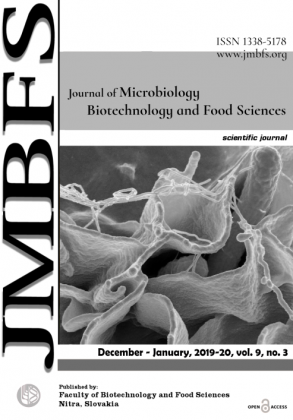THE EFFECT OF MILD TEMPERATURE STRESS ON THE OVARIAN ACTIVITY IN COWS
DOI:
https://doi.org/10.15414/jmbfs.2019/20.9.3.639-642Keywords:
temperature stress; corpus luteum; embryo transferAbstract
The aim of this study was to evaluate the effect of mild temperature stress on ovarian activity (corpus luteum count; transferable embryos; morulae and blastocysts) in cows. The evaluation included 54 Holstein cows superovulated and flushed at one farm in the Czech Republic in three different temperature periods in flushing day (mild hot season THI = 75.66; season with optimal temperature THI = 68.85; season with lower temperature THI = 45.56). The data were analysed using the PROC GLM of Statistica®. The statistical model included the effect of season and other factors (age; condition; breeding value) on the studied reproduction traits. The results showed significantly higher ovarian activity in the cooler period of the year than in periods of mild temperature stress. There was also a non-significantly better reproduction result in younger animals under optimal condition.Downloads
Download data is not yet available.
Downloads
Published
2019-12-01
How to Cite
BezdÃÄek, J., StádnÃk, L., Makarevich, A., KuboviÄová, E., Louda, F., HegeduÅ¡ová, Z. ., & Holásek, R. (2019). THE EFFECT OF MILD TEMPERATURE STRESS ON THE OVARIAN ACTIVITY IN COWS. Journal of Microbiology, Biotechnology and Food Sciences, 9(3), 639–642. https://doi.org/10.15414/jmbfs.2019/20.9.3.639-642
Issue
Section
Biotechnology
License
Copyright (c) 2019 BezdÃÂÄÂek, J., StádnÃÂk, L., Makarevich, A., KuboviÄÂová, E., Louda, F., Hegedüšová, Z., Holásek, R.

This work is licensed under a Creative Commons Attribution 4.0 International License.
All papers published in the Journal of Microbiology, Biotechnology and Food Sciences are published under a CC-BY licence (CC-BY 4.0). Published materials can be shared (copy and redistribute the material in any medium or format) and adapted (remix, transform, and build upon the material for any purpose, even commercially) with specifying the author(s).





